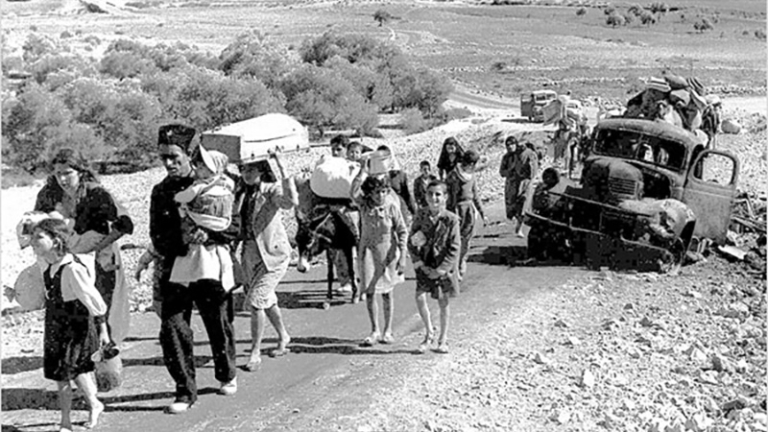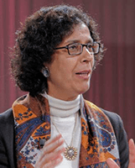
As Israel celebrates the 75th anniversary of its founding in 1948, the Palestinians commemorate the same number of years since the Nakba, the catastrophe, that caused the displacement and expulsion of hundreds of thousands of people who fled Palestine or were forcibly displaced to neighboring countries. Today, Palestinians living both inside historic Palestine and scattered across the region and the world number more than 14 million. For the overwhelming majority of Palestinians, the Nakba is ongoing. Those residing inside Israel as second-class citizens, or experiencing a brutal military occupation in the West Bank and East Jerusalem, or living under a state of siege in the Gaza Strip suffer from discrimination, the loss or absence of civil and national rights, and practices of apartheid carried out by the State of Israel.
Instead of rewriting old accounts of the Nakba, Arab Center Washington DC (ACW) is marking its 75th anniversary by focusing on the future of the Palestinian-Israeli conflict. We would like to see what might be in store for relations between Palestinians and Israelis, what Palestinian life could be like in the coming years, and what the next phase of the Palestinian struggle for independence may look like. As Israel rapidly veers politically and socially rightward under the leadership of far-right leaders who, among other things, threaten to undertake the ethnic cleansing of Palestinian villages in the occupied West Bank, Palestinians must think of how to affirm their civil and national rights and how to reinvigorate their national project for independence from Israeli control.
We have therefore asked some of our in-house and affiliated experts to contribute their thoughts about what the future may bring for Palestinians and Israelis, 75 years after the Nakba.
75 Years of the Nakba: Another Palestinian Challenging Turning Point
Khalil E. Jahshan, ACW Executive Director
By virtue of their long-term intractability and ever-growing complexity, protracted conflicts are quite frustrating to deal with for both academic specialists and interested laypeople alike. This tends to make objective analysis and the imparting of knowledge regarding these conflicts more challenging and strenuous. For the victims on all warring sides, conflicts tend to be equally frustrating, not just for these reasons but, more importantly, for the personal and collective pain they continue to incessantly inflict on their aggrieved parties. The Palestine conflict is no exception to this general observation, particularly since the Nakba did not start or end on a specific day in May 1948. Indeed, the Nakba is a never-ending process. Like a living organism, its adverse repercussions continue to grow, reproduce, adapt, and impact their social and political environment.
May 15, 2023 marks the 75th anniversary of the Nakba, the Arabic term used to refer to the catastrophic ordeal experienced by the Palestinian people because of the establishment of the State of Israel on May 14, 1948. Although most Palestinians and their regional and international supporters once thought that a political solution might be forthcoming in the not-too-distant future, the conflict remains unresolved, despite dozens of diplomatic attempts over the past seven and a half decades. The fact is that the majority of these “peace attempts” were one-sided, disingenuous, and half-hearted, and they predictably failed to find an effective solution to the key components of the conflict: Palestinian self-determination, the right of return, permanent borders, the status of Jerusalem, land confiscation, and security issues.
Therefore, 75 years after the creation of Israel and the consequent ethnic cleansing of Palestinian society, a peaceful resolution to the conflict remains as elusive as ever. The inhumane dispossession of the Palestinian people, the dismantling of their society, and their dispersion throughout the region and beyond proceed unabated in 2023, with little hope for any serious international rectification or a just redress.
As Israel celebrates its 75th Independence Day with special fanfare, the ruling extreme right-wing coalition government and its supporters worldwide are touting their “miraculous creation” that has evolved into the uncontested center of global Jewish ultranationalism and supremacy. They brag about their economic and military superpower status, but ignore the 800-pound gorilla in the room: the proud, self-declared fascists who brazenly deny Palestinian existence after 75 years of purported “peaceful coexistence” and who publicly call for “wiping out” or “erasing” Palestinian towns, showing a total disregard for the parallels this draws with their own community’s horrible historical experience. Israel is clearly governed today, more than at any other time in the past, by an ideologically motivated elite that is totally intoxicated by its own supremacy and unwilling to recognize the irrationality of its still unfulfilled Zionist dreams, or to even co-exist with its fellow Jewish-Israeli critics or—needless to say—with its Palestinian counterclaimants to the same piece of land.
A few miles down the road from the Israeli seat of power, and separated by the infamous “apartheid wall,” an unpopular, perplexed, and paralyzed Palestinian Authority is desperately holding on to power, oblivious to its own society’s overwhelming desire for change, for ending military occupation, and for a genuine transition to democracy and respect for human rights. After 75 years of statelessness and chaos, the Palestinian people want their freedom and their own place under the sun to call home. Is this still doable considering the dismal situation currently dominating Israeli and Palestinian politics?
As daunting as living conditions are under the Israeli occupation, most Palestinians know quite well that freedom is never free; it is costly indeed. They stoically pay that price every day as they continue to confront the increasingly aggressive Israeli occupation forces with fortitude and dignity in places like Jenin, Nablus, and Huwwara. The radicalization taking place in Israel is not dampening Palestinians’ spirit but is, contrary to Israeli expectations, emboldening their resistance to a brutal, determined, and powerful enemy in the face of insurmountable odds. It is only a matter of time before this new generation of Palestinians, who have never known what their homeland looked like in 1948, takes matters into its own hands and brings about change, both at home and across the so-called “Green Line.” This is the only way that the exclusion of the Palestinians from the universal march to freedom is going to end, with the young generation, born and bred under Israeli occupation, insisting on securing its inalienable right to self-determination, including the option of independent statehood.
The Collapse of the “Jewish State” and the Rise of Human Rights
Nadia Hijab, Co-founder and Honorary President, Al-Shabaka
The present stage of the Palestinian struggle for human rights is, particularly in occupied Palestine, a frightening and heart-rending one. So many Palestinians of all ages and walks of life—but especially young men—are being killed by Israeli soldiers and settlers without even the slightest accountability. And so much carefully tended Palestinian land—the wealth of generations—is being destroyed and colonized. Indeed, this has been the fate of millions of Palestinians over the past century, during the various stages of this struggle for rights. The difference today is that Israel’s racist far right is determined to make this phase the endgame, to crush and destroy what is left of Palestine and Palestinians in the occupied territories and in “Israel proper” and to close off access to Palestinians in the diaspora, as well as to their allies. They intend to finish the job that earlier generations of Israelis began, while much of the leadership in the United States and Europe—as well as that in many Arab states and in official Palestinian bodies—close their eyes to reality.
Despite the grim present, the Palestinian people consistently aspire to a future that guarantees their human rights, including their right of return and compensation as set out in UN Resolution 194. In this future, Palestinian Arabs and Israeli Jews will live side by side—a core principle from the early days of the founding of the Palestine Liberation Organization. Israeli apartheid will have been dismantled and replaced with equal rights for all those living in the land of Palestine-Israel. The future will be built on a different reality than the one present today: Israeli Jews and Zionists around the world will have come to understand the role that many of them played in the dispossession of the Palestinian people. There will be recognition of how Palestine was destroyed in order to create Israel. There will then also be a formal expression of regret for that dispossession. And there will be a mechanism for reparations for Palestinian losses over these many decades. Recognition, regret, reparations; these must be the foundations of a just and peaceful future.
Of course, this sounds impossible at the present time. Israeli forces appear at their strongest, and Israeli officials are welcomed everywhere. But the signs of the future are here. In Europe, where national governments are still in thrall to Israel, major city governments, including Barcelona, Liège, and Oslo, have stepped to the fore this year to suspend ties with the country. In the United States, support for Palestinian rights is growing, including among Jewish groups. For example, Jewish Voice for Peace, which has 300,000 members, states that it “unequivocally opposes Zionism” because it runs counter to the organization’s ideals of “justice, equality and freedom for all people.” Meanwhile, the general discourse is shifting fast. Authoritative publications are questioning Israel’s democratic credentials and its ability to maintain what is effectively an apartheid regime. And opinion polls show Democratic US voters increasingly shifting away from Israel.
On the home front, this year has seen a welcome collaboration between the Palestine Liberation Organization, the Boycott, Divestment, Sanctions movement, and Palestinian nongovernmental organizations in launching the first anti-apartheid conference against settler-colonialism. Their call harks back to the language used from the earliest days of the Palestinian national movement; it is a call that looks back in order to move into the future. Indeed, for the Palestinian movement and its allies to stay strong, they must avoid the errors of the past and sustain and grow their power while gaining strength from the knowledge that the future will be built on justice and human rights.
A SWOT Analysis Is Required for the Palestinian Future
Dalal Iriqat, Professor, Arab American University, Palestine
Assessing the Palestinian reality since the Nakba using a SWOT (Strengths, Weaknesses, Opportunities, and Threats) approach is the first step toward future-oriented strategic thinking for Palestinians if we wish to strategize for the future that Palestinians and their supporters would like to see happen. One needs to first admit that for 75 years, Palestinians have endured injustice under Israeli occupation, which is a major weakness and threat at the same time. The ongoing reality of the Palestinian-Israeli conflict is not a matter of periodic flare-ups; and labeling it a “conflict” is an understatement. What is happening is the ethnic cleansing of Palestine under the framework of a prolonged military occupation. Indeed, the Nakba is ongoing.
For 75 years, the world has been bearing witness to Israel’s de facto annexation of East Jerusalem, with the aim of expanding its settlement blocs to completely isolate the city from the West Bank, thus making impossible both Palestinian rights in Jerusalem and the hope for Palestinian statehood on the basis of the 1967 borders. This is obvious in Israel’s plans in Khan al-Ahmar, Jaffa Gate, the Old City, Sheikh Jarrah, and Beita, to say nothing of its siege of the Gaza Strip. Hundreds of United Nations resolutions have been passed; yet in practice, Israel’s occupation continues with impunity. After 75 years of state-organized violence, it is high time for accountability instead of shielding the occupation in international fora.
Despite Israel’s crushing oppression, one cannot ignore the opportunity that Palestinians’ steadfastness offers. This is a major source of strength, one that fuels hope in the face of the matrix of uncertainties that Palestinians face under the occupation. Palestinians must insist on attaining their political rights and self-determination, which will only be achieved in a package that consists of properly defining the borders of the state of Israel, ending the Israeli occupation, and holding Palestinian presidential and parliamentary elections to produce fresh new leadership that is inclusive of women and youth. The vast majority of the Palestinian population is under 30 and has obtained some level of higher education, a reality that should be reflected in state structures and institutions.
Israel’s de facto annexation of Palestinian territory is ongoing, as the state’s doctrine is anchored in the illegal settlements that constitute the basis of its colonial project. While the discourse of human rights, justice, and prosperity is important, the starting line of any solution will lie in putting an end to the Israeli occupation. A Marshall Plan approach for improving Palestinian economic conditions is doomed to fail if it is not enveloped in a political context. Efforts to deal with the Palestinian cause from a humanitarian perspective provide cover for the continued Israeli occupation. International and private companies are profiting from the need for humanitarian assistance, while Israel is sustaining a cost-free occupation and ensuring Jewish supremacy over the entire land.
There is room for strategic thinking if we start by assessing the reality on the ground. Palestinians can minimize weaknesses, avoid threats, maximize strengths, and capitalize on opportunities for peace, stability, and dignity for all people regardless of ideology or religion. But the first step must be ending the Israeli occupation, which will make possible a future for Palestinian freedom and statehood.
Rehumanizing Palestinians on the Anniversary of the Nakba
Mohammed Abu-Nimer, Professor, American University, Washington DC
In deep-rooted conflicts, there are obstacles to peace and reconciliation, such as dehumanization, hatred, and revenge. Learning to manage emotions is an important step in nurturing values, acquiring skills, and adopting behaviors that help all parties preserve their humanity and stay true to their sense of justice. This is an enormous burden on the shoulders of oppressed communities and their leaders, especially when done while living under brutal conditions. A good example is the struggle of Black South Africans and of indigenous populations in the United States, Canada, Australia, and New Zealand. Nevertheless, leaders such as Nelson Mandela and Martin Luther King Jr. adopted this ability as a crucial component of their resistance strategies. They insisted—despite brutal systems of oppression wielded by their respective countries’ dominant majorities and political leaders—that internal and external strategies of resistance are aimed at preserving the humanity of both the oppressed and their oppressors. This proved to be an effective position that gained solidarity from the international community, which took a stand to protect basic human rights and adopted sanctions against the oppressors in South Africa.
The Palestine liberation movement has been facing such conditions for at least the past 75 years. The Israeli occupation has developed techniques to deprive Palestinians of their individual and collective sense of humanity, and has engaged in a wide range of propaganda campaigns to dehumanize the Palestinians, especially those who resist. Such policies have been deployed against Palestinians inside Israel and in the territories occupied in 1967. For many, it is unrealistic and unpatriotic to think about humanizing the enemy in the midst of this violence. Nevertheless, there are ways in which oppressed communities can preserve their human dignity.
Remembering and memorializing historical narratives of the conflict is one mechanism that can significantly contribute to the perpetuation of the dehumanization, animosity, and distrust between conflicting sides; but it can also be a liberating and humanizing tool for both individual and nation. Thus, revisiting the 1948 Nakba with a rehumanizing narrative is an act that every Palestinian parent, educator, and religious leader (along with other socialization agents and allies) should take seriously. This can be symbolic or physical, and can include visiting destroyed villages, transferring the keys to stolen homes to the next generation, teaching traditional folklore, and planting and naming trees, to name just a few important practices. It is crucial to teach our next generation to not forget, and to remember in ways that preserve human dignity and delegitimize all processes of dehumanization. This is a powerful way to undermine current occupation policies and ensure a genuine internal Palestinian and Arab reconciliation, and to prepare Palestinians to consider future reconciliation processes with Israeli Jewish society in a post-conflict reality in which a sense of justice has been achieved.
This process is not exclusive to Palestinians; it is also necessary, and even more urgent, for Israeli Jews to undertake. Revisiting their collective memory of 1948 with a rehumanizing lens is a path to reclaim their own human dignity. It is also a way to prepare their society for genuine reconciliation in a post-conflict reality in which the Palestinians have gained their rights and are ready to engage in such a process.




